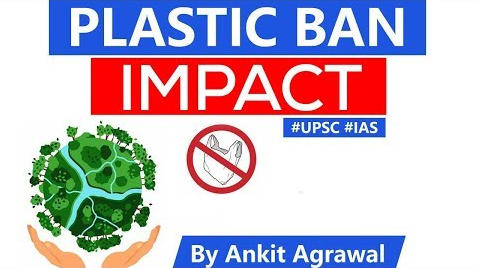Table of Contents

WHAT IS SINGLE-USE PLASTIC?
- Single-use plastics, or disposable plastics, are used only once before they are thrown away or recycled.
- They include- plastic bags, straws, water bottles and most food packaging.
- They are petroleum based & are not biodegradable.
COVERAGE OF BAN
- The government is leading efforts to scrap single use plastics by 2022.
- The ban will be comprehensive and will cover
- Manufacturing
- Usage
- Import of such items
IMPACT ON ENVIRONMENT
VISIBLE & INVISIBLE PROBLEM
- The first, since they are practically non-biodegradable, they end up on the roadsides, in landfills, lakes and oceans, and thus make their way into the food chain.
- It is felt acutely in India because our towns and villages do not have adequate waste disposal systems.
- The second invisible problem is their ecological footprint — in terms of the environmental cost vis-a-vis their production, transport and use.
THE PARADOX
- The paradox of the plastic bag is that its total environmental footprint is actually much lower than that of alternatives.
- According to a study conducted by the Danish government in 2018, you need to use a paper bag 43 times to achieve the same cumulative environmental impact as a plastic bag.
- To achieve the same environmental impact as the plastic bag, a cotton bag would have to be used 7,100 times.
- If India’s proposed ban on single-use plastics is successful, the benefit is that we will reduce plastic pollution, but at the cost of worsening the cumulative environmental impact.

IMPACT ON ECONOMY
NEGATIVE IMPACT
- A large part of existing investments, machinery, business processes and jobs in the plastics industry may be in trouble.
- Only big companies might be able to afford additional costs to replace old machinery.
- The burden of a plastic ban will disproportionately affect the poor because of the price of plastic bags.

- The packaged drinking water industry told the government that the PET bottles used by them should not be classified as single use plastic.
- It will have adverse impact on the Rs 30,000 crore industry since no alternative was immediately possible.
POSITIVE IMPACT
- The economic benefits will mainly arise from new investments and innovations in the packaging industry.
- Also good number of jobs will be created through it.


Latest Burning Issues | Free PDF






















 WhatsApp
WhatsApp